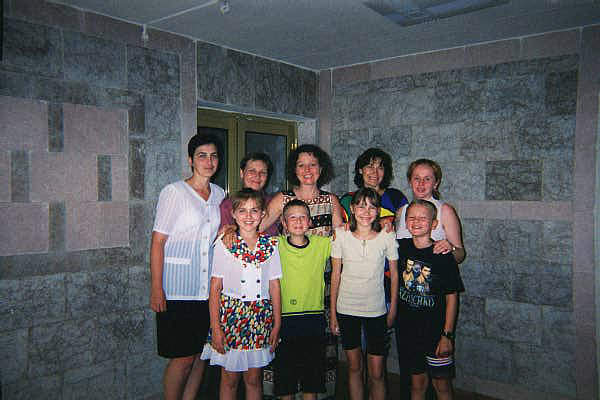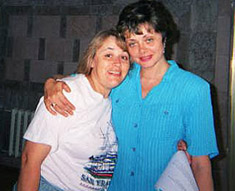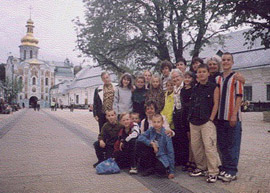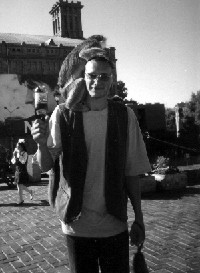|
UDP Highlights
|
 |
|
In July, Andy Skrypka, Ukrainian Diabetes Project Director, Ellen Simpson MD, and Kate Broderson made the 11th journey to Ukraine, returning to the Kiyiv region for the fourth year. As in the past, the medical team spent two weeks teaching children and their parents about diabetes care. This medical team also provided education, blood testing strips, and lancing devices to 120 children. |
 UDP Team: (left to right) Olga Prokopenko (translator), Andy Skrypka, and Dr. Ellen Simpson. |
As a new venture, UDP sponsored four village children at the camp. "We would not have had the opportunity to participate at camp this year if it wasn’t for the support of the Ukrainian Diabetes Project (UDP)", expressed one grateful mother.
The UDP not only teaches children and their parents how to live a healthy life with diabetes, but it encourages the fight for better healthcare. A long time advocate for patients’ diabetes needs in America, Skrypka encourages Ukrainian parents and children to do the same in Ukraine.
Kiyiv’s diabetes Camp "Orlenok" is located on the outskirts of Kiyiv. The UDP participated in two of the four camp sessions.
For the second year, through a special donation from Bayer Corporation, a DCA 2000 meter was brought to the camp. This meter measures blood glucose levels over a 3 month period called glycosylated hemoglobin or HbA1C. Seventy-five children were tested in 1999. “They were very anxious to have the test repeated again this year, Skrypka explained. They wanted to see if they were able to improve their blood sugar control over the past year.” Many new children had the test done for the first time. The American Diabetes Association recommends all diabetics have their HbA1C measured 2-4 times a year. Most children in Ukraine have never had the opportunity to take this test. The average HbA1C test for the 72 children tested was 10.5%. Normal HbA1C is 4-6%. The average HbA1C of diabetics in the US is 9.4%
Village Children|
This summer brought great fortune to four village children: Yanna Dmitrechenko, Vova Boiko,Ksenia Vikulina and Vasa Bacal. Through financial support from the Ukrainian Diabetes Project, four families were able to participate at Camp Orlenok for one 2-week session. "The families were overwhelmed with emotion upon meeting us," expressed Andy Skrypka, Project Director, filled with emotion herself. "It was a wonderful opportunity for all." The campers: |
 Pictured on the right are the village children and their mothers. (Bottom row: Yanna Dmitrechenko, Vova Boiko, Ksenia Vikulina, and Vasa Bacal. Top row: Mothers pictured with Andy Skrypka UDP Director). |
Ksenia Vikulina, 14 years old, lives in Sverdlovsk. She has had diabetes for 11 years. And last but not least is Vasa Bacal. He is 12 years old, lives in Boguslav and has had diabetes for 6 years. Each child was accompanied by their mother.
Living in a village brings extra concerns to children with diabetes. Distance to the hospital, lack of emergency vehicles, no personal transportation, and no phones, are just a few obstacles. These realities can mean life or death for a child with diabetes
Camp was a great opportunity for the mothers to connect with each other and talk about the battles ahead. Diabetics continue to cry for better healthcare, better insulin, access to information on diabetes and more.
Diabetes Charity Fund of Kiyivby Natalya Vlasenko
|
It is widely known that diabetes is not so much an illness as it is a way of life. Whether it is a manageable way of life depends on the availability of high-quality insulin and blood sugar controlling products to a diabetic. Access to social assistance and the means to self-control diabetes are also important. Unfortunately, in Ukraine little of this exists. Thus, people who have diabetes must fight for their lives by uniting together and forming organizations. |
 Natalya Manzheley and Natalya Vlasenko Co-directors of the Diabetes Charity Fund. |
In 1993, in the city of Kiyiv, the capital of Ukraine, individuals did exactly that-founded the organization "Diabetes Charity Fund of Kiyiv." It is a nonprofit organization that protects and represents the interests of individuals with diabetes. Currently, the Diabetes Charity Fund of Kiyiv represents 1500 members, 420 of which are children under the age of 18.
"We gather together to help teach each other ways to create a healthy lifestyle while living with diabetes," Fund president Natalya Vlaseko explains.
This organization works closely with government officials and sponsors seven programs throughout the year to keep its momentum.
What's New in Diabetes?There are many new developments in the field of diabetes. One development has to do with the diagnosis of diabetes itself. Many years ago we would only diagnose children with Type 1 diabetes. And, in fact, Type 1 diabetes continues to prevail among children in Ukraine. However, this is changing in the US. Today, we are starting to see children in the US with Type 2 diabetes. This type of diabetes is associated with obesity and insulin resistance. Why are children in the US developing Type 2 diabetes? Just look at the size of our kids and the sedentary lifestyle they lead. The causes include less physical activity in school and after school, and more computer gaming and TV watching. The treatment for these children includes better eating habits and more daily activity-not insulin. This is just the opposite of Type 1 diabetes. Children with Type 1 diabetes are insulin deficient. They NEED insulin. Exercise and good eating habits are secondary in their treatment. Another development is that the new blood glucose meters on the market are different than before. Many require tiny drops of blood-a plus for toddlers with diabetes. In addition, many use body parts other than the finger to obtain blood. Finally, new insulins are becoming available. Humalog, a very quick-acting insulin, has been available for a few years. This insulin is ideal for mealtime. Also Glargine, a non peaking long-acting insulin, will be released soon.
Ukrainian Diabetes Project - 10 Year Anniversary ApproachesNext summer, the Ukrainian Diabetes Project will be celebrating 10 years of continued service to the children with diabetes in Ukraine. The UDP came into fruition officially in 1992 through the auspices of a non-profit organization Promoting Enduring Peace, based on the East Coast. Later, in 1995 it became an official humanitarian aid program of the Diabetic Youth Foundation of Walnut Creek. It all started in 1990 when Andy Skrypka, a diabetic for nearly 30 years, learned about the Ukraine’s lack of insulin, a life saving medication for any person with Type 1 diabetes. She also learned that all diabetics in Ukraine were considered invalids, and in fact many children died on account of their diabetes. Having discovered that most diabetics in Ukraine lacked the knowledge needed to live with this condition, she got inspired. Every summer since, Skrypka a certified diabetes educator and registered dietitian, packs her bags and gathers thousands of dollars worth of diabetic supplies. Accompanying her over the years as part of the medical team are doctors, nurses, dietitians, fellow diabetics, Ukrainian-Americans, pharmaceutical representatives, friends and even family. All members volunteer their time teaching diabetes education to the children and parents, distributing diabetes supplies, and/or assisting in various ways. Back in the US, volunteers help with the organization of shipping supplies, fund-raising events and office operations, just to name a few tasks. UDP has sponsored exchanges between summer diabetes camps with the Diabetic Youth Foundation. So far, over $1.9 million worth of diabetes supplies have been provided to the diabetic children in Ukraine. Over 1,900 children have received supplies.
Other Diabetes Camps and Facilities in Ukraine|
The Ukrainian Diabetes Project tries to stay informed about other diabetes camps active in Ukraine. Since 1990, UDP has collaborated with the medical staff in seven regions of Ukraine: Cherkasy, Poltava, Kharkiv, Vinnitsa, Ternopil, Sudak, and most recently in Kiyiv. According to resources attending a conference in November 2000 in Kiyiv, Days of Diabetes, most camps were not in operation this past summer. This was mainly due to the great economical burden the country continues to experience. Kiyiv is very fortunate to have the non-profit organization "Diabetes Charity Fundof Kiyiv" led by visionaries who continue to keep their summer camp alive. |
 Group of campers from the Diabetes Charity Fund of Kiyiv at an excursion at a historical site in Kiyiv. |
About Dmitriy...
|
|

|
Dmitriy Sumofal, age 20, died this summer from a complication unrelated to diabetes. He was a camp counselor at Camp Orlenik in Kiyiv. He had diabetes and was a great athlete. He was a positive role model to the young children at camp.
Until there is a cure, there is education.
Thank you for your contributionThe UDP operates solely from individual contributions like yours. Every summer, our medical team volunteers their time to educate the diabetic children and their families in Ukraine and to provide them with diabetes supplies.
We can only continue our efforts with your help. We would like to take this opportunity to thank everyone for their generous support.
Although we wish we had the space to list all gracious contributors, we would like to take this opportunity to acknowledge the following individuals who have donated $100.00 or more.
Carol Newton Babbini, John Batz, JJ & PA Bazzano, Elizabeth Burnham, Larry Carbine, John & Mollie Carroll, Bruce Coston & Margaret Bregger, Georgia & Emory Elliott, Russell Elmer MD, Ambrose & Kay Furey, Barbara & Gary Greensweig MD, Lois Gresh, Earl Herr, Roy & Isabella Ingles, Dorothea Joos, Alexander Kolesnikov, Harlan & Joann Lee, George Mackiw, Elaine Morrissey, Kathleen Murphy LCSW, David Price MD, Patria and Ronald Priore, Jonathan Reynolds, Broy Riha, Marilyn Rowand, Dwight Russell & Nancy McGowan, Milo & Neil Shepard, Martin Shelton-Food For Thought/Newman’s Own, Inc, Ellen Simpson MD, Walter Strutz, Christina & Andrew Tershakovec, William Thomas, Murray & Anne Tolmie, Gordon & Janet Tsuchiya,
Committee to Aid Ukraine, Dollar Drug, Helen M. Harrison Foundation, Parker Hannifin Corporation, Robert Frisby Foundation,
Maria Lewytzkyj (REPORT editor)
Supply Donation
This year's supplies were donated by the following:
Bayer Corporation , Diabetic Youth Foundation, Roche Diagnostics

